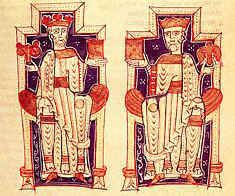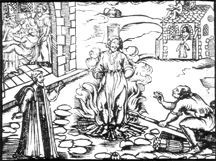Observations of an Alien realm

Negotiations were complex and mutual, until Robert was burned
Spartenos blood stir in the...
Viceroy of Syria
Dementios grew old and passed away. Guigues his francophilic and catholic son, de-facto took the mantle. He was the scorn of the Orthodoxists, who proceeded to whinge loudly. Events in Italy would rivet his attention, Roberts only son vanished and with him Norman hopes to continue their authority. Depressed, spies reported Robert grew mad and zealous. One evening a messenger rushed in, declaring to Guigues that not only was Orthodoxy illegal but it was heathen; an "Religious Inquisition" had begun by the zealous Friar sect. Orthodox counts were uprooted and burned, new rulers from Flanders and France grew into their estates, Friars questioned burning villages enmasse; Guigues breathed a sigh of relief. Messina, Taranto and Naples reconverted to catholicism, Rome looked close to toppling. But two factors set him into action: Naples debt had hit the -5000 mark (Notes 3.1) and Robert became papal controller, he now had the power to excommunicate any catholic ruler from succession. The risk was too great, one night in Benvento Robert was dragged out of bed. Twelve Orthodoxists, former priests but now hunted heathens swathed him in an oily sack, then set it alight with Greek fire. The Spartenos coup-de-etait had begun.

An late 16th Century Puglian picture,
dipicting Robert taken from bed and burned.
Research has shown that he was actually "sacked"
rather then staked
3.1 AI don't go into debt, stupid!
Ever notice how if you inherit a title you follow AI rules? Well an AI inheriting a human follows human rules... I guess its a good thing that AI don't fall into debt!

Negotiations were complex and mutual, until Robert was burned
Spartenos blood stir in the...
Viceroy of Syria
Dementios grew old and passed away. Guigues his francophilic and catholic son, de-facto took the mantle. He was the scorn of the Orthodoxists, who proceeded to whinge loudly. Events in Italy would rivet his attention, Roberts only son vanished and with him Norman hopes to continue their authority. Depressed, spies reported Robert grew mad and zealous. One evening a messenger rushed in, declaring to Guigues that not only was Orthodoxy illegal but it was heathen; an "Religious Inquisition" had begun by the zealous Friar sect. Orthodox counts were uprooted and burned, new rulers from Flanders and France grew into their estates, Friars questioned burning villages enmasse; Guigues breathed a sigh of relief. Messina, Taranto and Naples reconverted to catholicism, Rome looked close to toppling. But two factors set him into action: Naples debt had hit the -5000 mark (Notes 3.1) and Robert became papal controller, he now had the power to excommunicate any catholic ruler from succession. The risk was too great, one night in Benvento Robert was dragged out of bed. Twelve Orthodoxists, former priests but now hunted heathens swathed him in an oily sack, then set it alight with Greek fire. The Spartenos coup-de-etait had begun.

An late 16th Century Puglian picture,
dipicting Robert taken from bed and burned.
Research has shown that he was actually "sacked"
rather then staked
Notes
3.1 AI don't go into debt, stupid!
Ever notice how if you inherit a title you follow AI rules? Well an AI inheriting a human follows human rules... I guess its a good thing that AI don't fall into debt!




